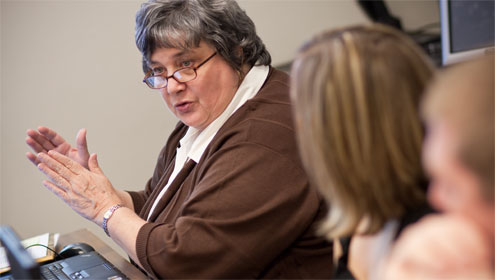
U.S. high school students continue to trail their peers in other countries in math and science skills, scoring lower than their counterparts in 22 countries in science literacy and 39 countries in mathematics literacy, according to a 2006 survey. The new Wake Innovative Noyce Scholars (WINS) program is poised to help change that by encouraging highly qualified individuals holding bachelor’s degrees in biology, chemistry, mathematics or physics to take up the call to teach.
“The shortage of math and science teachers is making it difficult to fill high school classrooms with qualified teachers.” says education professor Leah McCoy who co-directs the program with Angela King, a senior lecturer in chemistry. “Studies show that the teacher is the most important factor in whether or not students achieve. That’s a strong reason to work on developing excellent teachers for math and science, and that’s exactly what Wake Forest’s Master Teacher Fellows program has been doing successfully for over 20 years.”
The WINS program is part of the Master Teacher Fellows program, an intensive 13-month program leading to a Master of Arts in Education degree. With support from the National Science Foundation, the program will provide funding and support for up to eight prospective math and science teachers a year.
Applications are now being accepted for the first class of WINS scholars, to enroll next summer. Students who are selected will receive full tuition and a stipend, and mentoring for two years after graduation. In return, they agree to spend two years teaching in a high-needs high school.
“Any impact a person can have as an individual in their professional field is amplified by teaching through a ripple effect,” says King. “It’s a chance to change the prevailing social attitude. Meet an adult who cannot read the newspaper, and we are shocked. Meet an adult who doesn’t understand probability or statistics, and most of us don’t think a thing of it. Ignorance in math and science is considered acceptable in our culture — especially for women — even though these disciplines are equally important to being a productive member of society. Teachers have an opportunity to change this.”
Related Links
» WINS: Wake Innovative Noyce Scholars
» Wake Forest Education Department Graduate Programs
» Wake Forest’s education program earns high marks
Categories: Uncategorized
Headlines
Wake Forest in the News
Wake Forest regularly appears in media outlets around the world.




